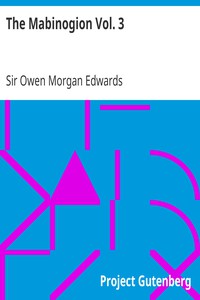The Mabinogion by Lady Charlotte Schreiber (best self help books to read txt) 📗

- Author: Lady Charlotte Schreiber
Book online «The Mabinogion by Lady Charlotte Schreiber (best self help books to read txt) 📗». Author Lady Charlotte Schreiber
Concerning the gripe of death they think not;
Neither lodging nor charity do they give;
Indulging in victuals to excess.
Psalms or prayers they do not use,
Tithes or offerings to God they do not pay,
On holidays or Sundays they do not worship;
Vigils or festivals they do not heed.
The birds do fly, the fish do swim,
The bees collect honey, worms do crawl,
Every thing travails to obtain its food,
Except minstrels and lazy useless thieves.
I deride neither song nor minstrelsy,
For they are given by God to lighten thought;
But him who abuses them,
For blaspheming Jesus and his service.”
Taliesin having set his master free from prison, and having protected the innocence of his wife, and silenced the Bards, so that not one of them dared to say a word, now brought Elphin’s wife before them, and showed that she had not one finger wanting. Right glad was Elphin, right glad was Taliesin.
Then he bade Elphin wager the king, that he had a horse both better and swifter than the king’s horses. And this Elphin did, and the day, and the time, and the place were fixed, and the place was that which at this day is called Morva Rhiannedd: and thither the king went with all his people, and four-and-twenty of the swiftest horses he possessed. And after a long process the course was marked, and the horses were placed for running. Then came Taliesin with four-and-twenty twigs of holly, which he had burnt black, and he caused the youth who was to ride his master’s horse to place them in his belt, and he gave him orders to let all the king’s horses get before him, and as he should overtake one horse after the other, to take one of the twigs and strike the horse with it over the crupper, and then let that twig fall; and after that to take another twig, and do in like manner to every one of the horses, as he should overtake them, enjoining the horseman strictly to watch when his own horse should stumble, and to throw down his cap on the spot. All these things did the youth fulfil, giving a blow to every one of the king’s horses, and throwing down his cap on the spot where his horse stumbled. And to this spot Taliesin brought his master after his horse had won the race. And he caused Elphin to put workmen to dig a hole there; and when they had dug the ground deep enough, they found a large cauldron full of gold. And then said Taliesin, “Elphin, behold a payment and reward unto thee, for having taken me out of the weir, and for having reared me from that time until now.” And on this spot stands a pool of water, which is to this time called Pwllbair.
After all this, the king caused Taliesin to be brought before him, and he asked him to recite concerning the creation of man from the beginning; and thereupon he made the poem which is now called “One of the Four Pillars of Song.”
“The Almighty made,
Down the Hebron vale,
With his plastic hands,
Adam’s fair form:
And five hundred years,
Void of any help,
There he remained and lay
Without a soul.
He again did form,
In calm paradise,
From a left-side rib,
Bliss-throbbing Eve.
Seven hours they were
The orchard keeping,
Till Satan brought strife,
With wiles from hell.
Thence were they driven,
Cold and shivering,
To gain their living,
Into this world.
To bring forth with pain
Their sons and daughters,
To have possession
Of Asia’s land.
Twice five, ten and eight,
She was self-bearing,
The mixed burden
Of man-woman.
And once, not hidden,
She brought forth Abel,
And Cain the forlorn,
The homicide.
To him and his mate
Was given a spade,
To break up the soil,
Thus to get bread.
The wheat pure and white,
Summer tilth to sow,
Every man to feed,
Till great yule feast.
An angelic hand
From the high Father,
Brought seed for growing
That Eve might sow;
But she then did hide
Of the gift a tenth,
And all did not sow
Of what was dug.
Black rye then was found,
And not pure wheat grain,
To show the mischief
Thus of thieving.
For this thievish act,
It is requisite,
That all men should pay
Tithe unto God.
Of the ruddy wine,
Planted on sunny days,
And on new-moon nights;
And the white wine.
The wheat rich in grain
And red flowing wine
Christ’s pure body make,
Son of Alpha.
The wafer is flesh,
The wine is spilt blood,
The Trinity’s words
Sanctify them.
The concealed books
From Emmanuel’s hand
Were brought by Raphael
As Adam’s gift,
When in his old age,
To his chin immersed
In Jordan’s water,
Keeping a fast,
Moses did obtain
In Jordan’s water,
The aid of the three
Most special rods.
Solomon did obtain
In Babel’s tower,
All the sciences
In Asia land.
So did I obtain,
In my bardic books,
All the sciences
Of Europe and Africa.
Their course, their bearing,
Their permitted way,
And their fate I know,
Unto the end.
Oh! what misery,
Through extreme of woe,
Prophecy will show
On Troia’s race!
A coiling serpent
Proud and merciless,
On her golden wings,
From Germany.
She will overrun
England and Scotland,
From Lychlyn sea-shore
To the Severn.
Then will the Brython
Be as prisoners,
By strangers swayed,
From Saxony.
Their Lord they will praise,
Their speech they will keep,
Their land they will lose,
Except wild Walia.
Till some change shall come,
After long penance,
When equally rife
The two crimes come.
Britons then shall have
Their land and their crown,
And the stranger swarm
Shall disappear.
All the angel’s words,
As to peace and war,
Will be fulfilled
To Britain’s race.”
He further told the king various prophecies of things that should be in the world, in songs, as follows.
* * * * *
[1] It is also stated, that there is in the Hengwrt Library, a MS. containing the Graal in Welsh, as early as the time of Henry I. I had hoped to have added this to the present collection; but the death of Col. Vaughan, to whom I applied, and other subsequent circumstances, have prevented me from obtaining access to it.
[2] Hades.
[3] The word “Pryder” or “Pryderi” means anxiety.
[4] The version in the Greal adds, “And their coin was fairy money;” literally, dwarf’s money: that is, money which, when received, appeared to be good coin, but which, if kept, turned into pieces of fungus, &c.
[5] This dialogue consists of a series of repartees with a play upon words, which it is impossible to follow in the translation.
[6] Taliesin.
[7] The mention of Gwyddno Garanhir instead of Elphin ab Gwyddno in this place is evidently an error of some transcriber of the MS.





Comments (0)